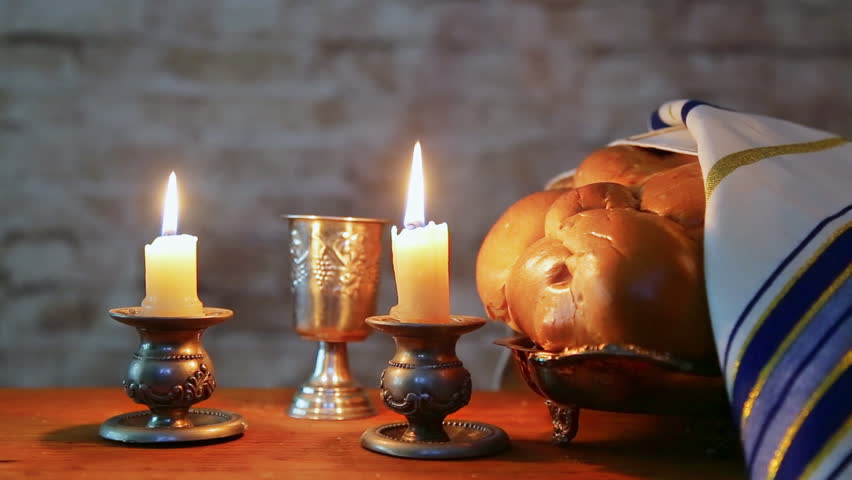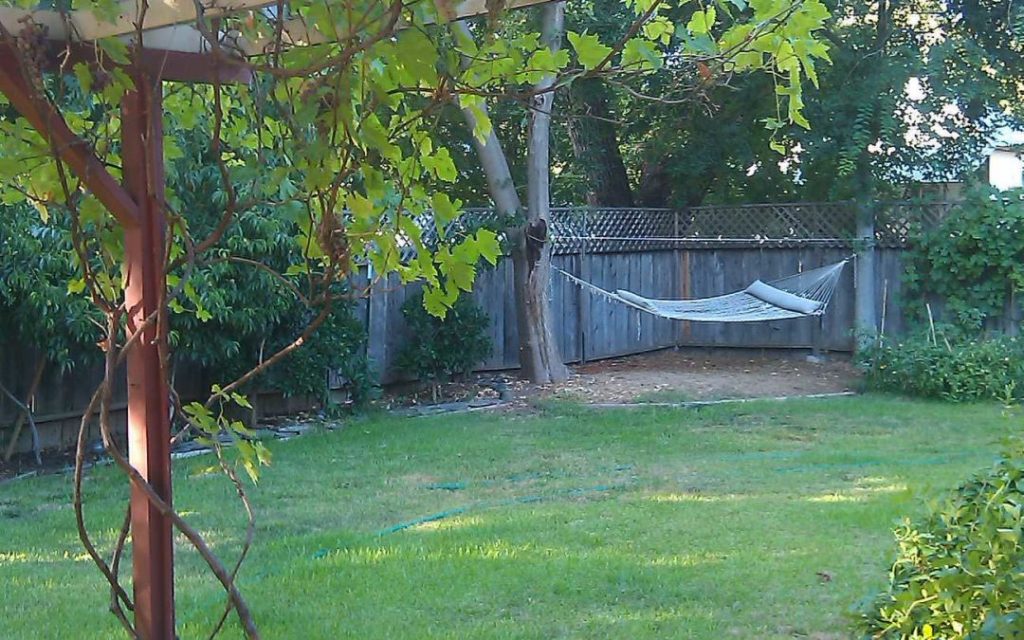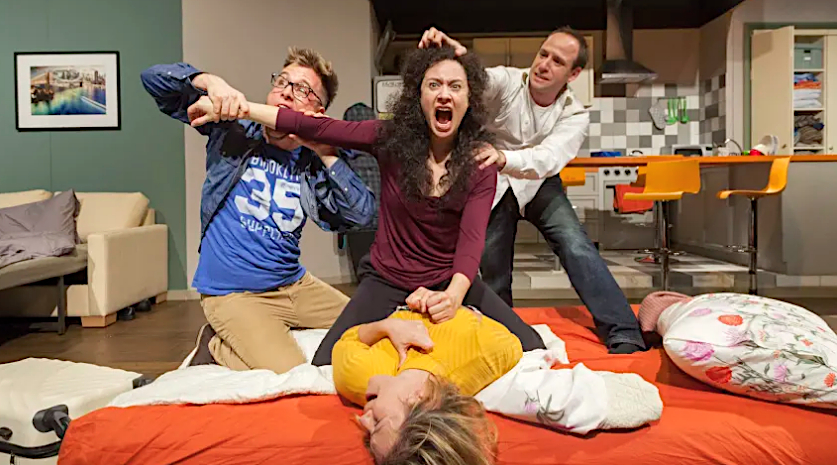(5-6 Minute Read)

Like millions of other Jews around the world, Barry Moscovitz had no choice but to start davening, or praying, at home as synagogues and Jewish worship centers temporarily closed their doors for the COVID-19 pandemic. So Barry, along with his wife and four children, sadly took their leave of their usual community, Congregation Beth Chelm. Instead, they soon transformed their living room into a make-shift synagogue, especially as the sun lowered each Shabbat. To be machmir, the Moscovitz family piled throw pillows on top of the couch to create a mechitzah, or barrier, and gathered on each side of it by gender. Barry Moscovitz donned his tallit and led his family in tefillah, or prayer, especially on Shabbat. His wife and two sons, aged seventeen and nine, as well as his two daughters, aged fourteen and six, all joined their father in prayer, and otherwise adjusted their Jewish religious life to accommodate the Coronavirus lockdown measures.

But the seemingly idyllic home synagogue, now referred to as “Congregation Beit Moscovitz,” soon became rife with discord. It all started when Barry’s eldest son, Manny, complained about the dreary tune used by his father for Lekah Dodi one Friday evening.
“Abba,” the teenage son whined in annoyance. “Why do you always use that tune? It sounds like a funeral dirge. Why can’t we do something more lively instead, like Carlebach?”
Barry Moscovitz ardently refused, insisting that as the acting chazzan, or prayer service leader, as well as the defacto rabbi, he was in a position of sole authority to decide which tunes were used in tefillah, or prayer. Barry’s wife, Lottie, rolled her eyes and said they should put the tune dispute to a vote. The Moscovitz family voted five to one against Barry and in favor of Carlebach. But Barry Moscovitz ignored the vote, and the rest of the Moscovitz family established the Beit Moscovitz synagogue board.
The following morning, the Moscovitz family proceeded with their Shabbat services at Beit Moscovitz. Barry pounded on the coffee table more than once, calling for silence as his nine year-old son, Josh, disrupted the morning prayers with unnecessary social chatter. The “rabbi” also became irritated at the youngest member of the community, six year-old Hadassah, for dozing off during his d’var Torah sermon in lieu of her afternoon nap.
Later on during the service, Lottie Moscovitz, now the defacto president of Beit Moscovitz, expressed harsh words of criticism for her husband and acting rabbi and chazzan of the home synagogue for sneaking into the kitchen during morning tefillah and inviting his seventeen year-old son to partake in the “Kiddush club.”
“Barry,” “President” Lottie glared at her husband over the makeshift mechitzah with crossed arms. “Put the Slivovitz away. You are not going to drink that with our seventeen year-old son. And besides, we are in the middle of davening! You are the chazzan and the rabbi, remember?”

“Rabbi” Barry scowled and returned to the living room, and continued davening. Eventually the family made Kiddish together and sat down for lunch.
“My gefilte fish doesn’t have a carrot slice on it!” nine year-old Josh Moscovitz complained emphatically as he was served a chunk of Ashkenazi-style ground fish. “We need to have a meeting with the head of the meals committee immediately.”
“Shut up and eat it, Josh,” fourteen year-old Rivka snapped back at her little brother. “As head of the meals committee, I declare that you will take it or leave it.”
“You can’t talk to the gabbai that way!” Josh retorted, reminding the head of the meals committee of his prestigious position within Beit Moscovitz.
“Well, I second the motion,” “President” Lottie affirmed. “Now stop complaining and eat your fish.”

Six year-old Hadassah, distressed by the arguing, then began to cry at the Shabbat table, although it seemed evident that her wails were more of an attempt to gain attention rather than being sincerely upset.
“Now look at what you two have done,” “Rabbi” Barry growled at his two children. “You have made our head of fundraising cry. How do you expect us to keep paying for our Shabbat services and functions if Hadassah is too upset to fundraise?”
Manny muttered as he shook his head in disapproval, “I still don’t understand how Hadassah got to be the head of the fundraising committee.”
“That’s obvious,” “President” Lottie explained. “Hadassah spends half of her life whining and crying. She’s perfect for Jewish fundraising.”
Following the meal and Birkat HaMazon, “Rabbi” Barry stood up and announced, “Mincha and Maariv, afternoon and evening prayers, are scheduled for six o’clock this evening.”
“Abba,” Manny objected, “Can we do mincha right after lunch? I won’t be able to make it to a late afternoon mincha.”
“What do you mean, ‘you can’t make it’?” Barry retorted in irritation. “What do you have to do all of Shabbat? We are shomer Shabbat and stuck at home, for crying out loud!”
“Yeah, Abba, but you know how it goes,” Manny replied with a shrug. “I’ve got ‘Shabbat stuff’ to do.”
“And,” Rivka added, “Dinah is supposed to come by to show me her new dress that she got from Amazon on Friday.”
“Dinah can’t come into our house,” Lottie warned with a raised eyebrow.
“Oh, I know,” fourteen year-old Rivka reaffirmed to her mother and the Beit Moscovitz “president.” She is going to stand in the street in her new dress while I watch from the window and shout down to her. After all, it wouldn’t be a true Shabbat experience if I wasn’t comparing my clothes to somebody else’s.”

“So let’s put it to a board vote,” Lottie announced. “All in favor of mincha after lunch, say ‘Aye.’ And the majority have said ‘Aye.’ The ‘Aye’s’ have it. Mincha will be held after lunch.”
“This is ridiculous,” Barry stood up in protest and announced, “I am the chazzan, and I say we are praying at six this evening.”
“Let’s have another board vote,” Rivka declared with a hint of defiant mischief. “All in favor of replacing the rabbi and chazzan of Beit Moscovitz with Manny Moscovitz, say ‘Aye.’ And the ‘Aye’s’ have it. Manny, you are the new rabbi and chazzan.”
“Rivka, let’s not be disrespectful to your father,” “President” Lottie countered as her husband fumed. “Barry is your father and the head of this household. We can’t just vote him out of his position as rabbi and chazzan. We need to instead bestow upon him an honorary title, like ‘rabbi emeritus.’ You know, it’s a title that lets us give a token of respect to your father while we pretty much just ignore him. All those in favor of making Manny the acting rabbi and chazzan and instead changing your father’s title to ‘rabbi emeritus,’ say ‘Aye.’ And the ‘Aye’s’ have it. Sorry, Barry.”
“This is preposterous!” Barry fired back incredulously. “Manny isn’t qualified for those positions!”
“Since when did qualifications ever matter when a synagogue board chooses to replace their rabbi? Besides, Barry,” “President” Lottie countered, “everybody likes Carlebach tunes better than yours.”
“That does it! I am starting a new synagogue in the backyard, ‘Tefilat Gan Barry.’ Who is coming with me?”
The rest of the Moscovitz family stared back at Barry in awkward silence.
“Josh,” Barry spoke to his son and suddenly changed to a tone dripping with sugar. “I’ll make sure that your gefilte fish always has a piece of carrot on top of it.”
“That’s tempting, Abba,” nine year-old Josh responded as he pondered his options and glared back at his teenaged sister, Rivka. “I know! I am going to daven at Beit Moscovitz, but I’ll have kiddush and lunch in the backyard at Gan Barry.”
“No,” Barry retorted firmly. “At Gan Barry, we will not have any ‘just for kiddush’ Jews in attendance. If you don’t daven at Gan Barry, then you don’t eat at Gan Barry.”
“Fine,” Josh grumbled. “Then I am now ‘unaffiliated,’ meaning that I will spend half of my time at Beit Moscovitz, and the other half at Gan Barry.”
“I’ll take it. Welcome to my shul,” Barry announced happily as he affectionately patted his son on the shoulder.

Later in the afternoon as the sun lowered in the sky, Barry and Josh stood in the backyard and prepared to daven the mincha prayer service. Next door, the Rothstein’s filtered out of the house.
“Shabbat shalom from Tefilat Gan Barry,” Barry waved to the patriarch of the Rothstein family.
“And shabbat shalom from Temple Beth Rothstein,” Paul Rothstein replied. Paul Rothstein and his family likewise had started their own family-sized synagogue. But their Jewish affiliation was with a less traditional and more egalitarian community, and thus the home-based “Temple Beth Rothstein” was created.
“Not to speak about matters of money on Shabbat,” Barry addressed his neighbor as he leaned on the low, broken-down fence separating the two properties. “But do you think that tomorrow you can give me the money you promised me to pay for half of the fence repair? Since Tefilat Gan Barry is now meeting in the backyard, and since you have your egalitarian functions and services in your backyard, I would like to replace the fence as soon as possible. And since Home Depot is the only place open right now, replacing the fence is about the only thing I can do tomorrow.”
“Sorry, Barry,” Paul answered as he shook his head in the negative. “That’s not going to work now.”
“What? What do you mean? You promised me that you would pay for half of it.”
“Yeah, but that was different. Two months ago I committed to building a new fence with my neighbor. But Temple Beth Rothstein never committed to the building of a mechitzah. That goes against our progressive, egalitarian Jewish beliefs.”
“That’s ridiculous! Tomorrow morning you and I are having an intercommunity meeting, rabbi to rabbi,” Barry demanded in aggravation.
“Oh, I’m not the rabbi,” Paul replied with a smile. “I’m the treasurer. My wife is the rabbi. And she said ‘Paul, no mechitzah’.”
“You should vote her into an emeritus position,” Barry grumbled in parting as he rolled his eyes and stomped off.

“Now what are we going to do, Abba?” Josh queried with wide eyes.
“We will go pray in the front yard instead,” Barry Moscovitz replied with determination in his voice. “And the next time there are elections at Congregation Beit Moscovitz, we will take back control of the synagogue through political maneuvering.”
And so the Moscovitz home synagogue split and formed two houses of worship that seemingly could never be reconciled. And Barry Moscovitz pledged to himself, blee neder, that he would never set foot in his living room ever again.



